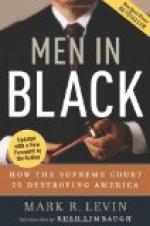The judge finally becomes worn out, a kind of self-hypnosis sets in. He remembers so many phrases and legal maxims that he might enunciate, his brain becomes confused as to selection. There are volumes of charges to juries which he has more or less learned by heart. There are so many glittering and vague generalities about the law of negligence, the law of contracts, the law of evidence, the burden of proof, or the weight of testimony, that he could go on indefinitely. The jury have ceased to understand and the judge realizing the hopelessness of this situation, winds up by saying—“So, gentlemen, bearing in mind what I have just told you and the evidence in the case, you will retire and consider your verdict.”
The jury begin to gather their hats and coats, when up jumps one of the lawyers and says: “One moment, please. I ask your Honor to charge that if the jury find the cow that was in the plaintiff’s garden was a white cow and not a red cow, then their verdict must be for the defendant.” “I so charge,” says the judge. “I except,” says the other lawyer, “and I ask your Honor to charge the jury that if they believe the cow was the property of the defendant, their verdict must be for the plaintiff.” “I refuse to charge in those words,” says the judge, “there may not have been any cow or he may not have eaten the cabbages.” Or the lawyer for the railway may ask the judge, “That if the jury find that the driver was forty feet away from the tracks and the car was a hundred feet away from the corner of Seventy-eighth Street when he first saw the car, and the car was going at a rapid rate and the conductor pulled the bell and the driver was sitting on the right-hand side of the wagon and might have seen the car had the car been one hundred feet below the corner, then in that event I ask your Honor to instruct the jury that the plaintiff was guilty of contributory negligence and cannot recover.”
The question is undoubtedly a poser. The judge is evidently worried; if he make a wrong guess and says “yes” or “no” at this juncture, the appellate court may say: “Error, judgment reversed, new trial ordered.” What happens is that the judge takes a chance. The lawyer says, “I refer you to 169 New York Court of Appeals Reports, page 492; in the case of Jones vs. Metropolitan, the court there said that the refusal to so charge was reversible error.” The judge looks wise and finally says, “yes.” There is a little playing of politics in this; he has possibly been thinking how the jury are going to decide and realizing that what he charges won’t make any difference, he plays safe by charging what the losing side wants.




